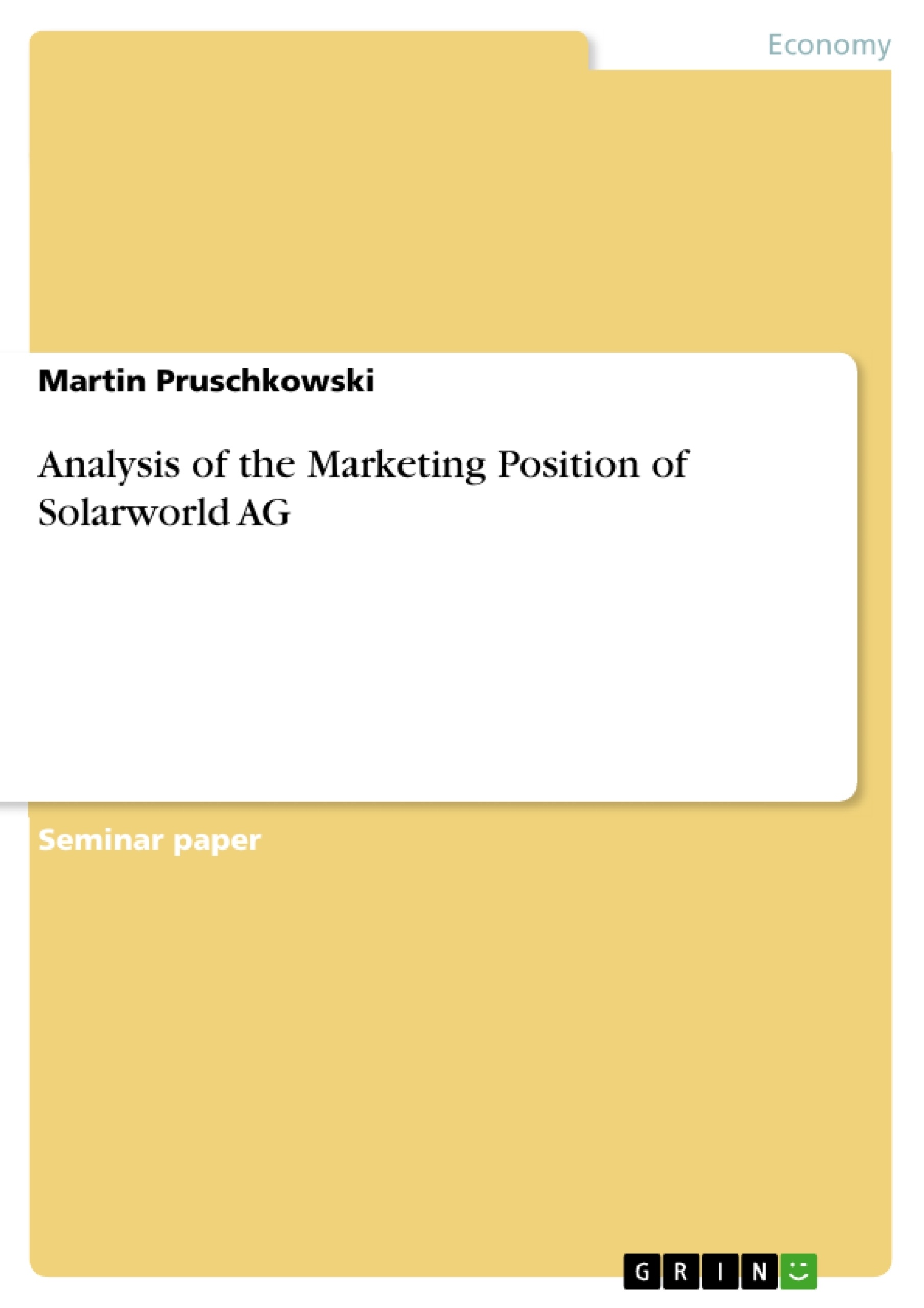SolarWorld AG is an international photovoltaic energy company that manages all stages of production starting by the raw material silicon for solar wafers to the entire solar module ‒ including its own research and development. Through an international distribution network, SolarWorld supplies customers all over the world with solar modules and complete systems. SolarWorld is through its subsidiary company Solarparc AG also involved in the construction of several large-scale solar power stations and operates with approximately 2,600 employees two production sites - one in Germany and one in the United States. The company is based in Germany. The by far biggest part of the entire sales is generated in Germany (49.5%) followed by the United States (23%) and the rest of Europa (19 %).
The objective of this assignment is a complete and comprehensive analysis of SolarWorld AG and its surroundings. In order to get a complete picture of the current situation the company has to face, it is necessary to analyse in a first step, the Macro- as well as a Micro environment of the company. For this a macro- as well as a Microanalysis is performed. In a second step the by the analysis recovered data and information are collected and interpreted in a SWOT (Strength, Weaknesses, Opportunities, Threat) analysis. Finally, the SWOT is carried out to create the basis for a future strategy.
For that work no primary data was collected, the entire work is based on secondary data. The necessary information for the analyses that were previously only scattered published or accessible will be combined and analysed by the author. The sources of secondary data are, for example, the annual report of the company.
Inhaltsverzeichnis (Table of Contents)
- Introduction
- Brief introduction to SolarWorld
- The stock price performance of SolarWorld
- News and latest situation of SolarWorld
- Problem definition
- Objectives
- Methodology
- Macro Analysis
- The PEST(EL) Analysis
- Political Factors
- Economic Factors
- Environmental Factors
- Technological Factors
- Missing Factors
- Micro Analysis
- Porters Five Forces
- The risk of entry by potential competitors
- The intensity of rivalry among established companies within an industry
- The bargaining power of buyers
- The bargaining power of suppliers
- The closeness of substitutes to an industry's products
- SWOT Analysis
- Internal analysis
- Strengths
- Weaknesses
- External analysis
- Opportunities
- Threats
- Turning SWOT Analysis into a Strategic Plan
- Results and Interpretation
Zielsetzung und Themenschwerpunkte (Objectives and Key Themes)
This study aims to analyze the marketing position of SolarWorld AG by examining the company's current situation, market dynamics, and future prospects. The analysis focuses on understanding SolarWorld's strengths, weaknesses, opportunities, and threats in the global photovoltaic market.
- Analyzing SolarWorld's current market position and competitive landscape
- Identifying key external factors influencing the solar energy industry
- Evaluating SolarWorld's internal strengths and weaknesses
- Exploring potential opportunities and threats for SolarWorld's future growth
- Developing recommendations for improving SolarWorld's marketing strategy and overall competitiveness
Zusammenfassung der Kapitel (Chapter Summaries)
The initial chapters provide an introduction to SolarWorld AG, outlining its history, stock price performance, and current market situation. The analysis then delves into the company's marketing position by exploring the macro environment through a PESTEL analysis and the micro environment through Porter's Five Forces framework.
The SWOT analysis further examines SolarWorld's internal and external factors, identifying its strengths, weaknesses, opportunities, and threats. The study concludes with an interpretation of the findings and recommendations for improving SolarWorld's marketing strategy.
Schlüsselwörter (Keywords)
The study focuses on analyzing the marketing position of SolarWorld AG within the global photovoltaic industry. Key terms include PESTEL analysis, Porter's Five Forces, SWOT analysis, photovoltaic (PV) technology, renewable energy, and the competitive landscape of the solar energy market. The analysis also examines factors like stock price performance, financial performance, and market trends in the solar energy sector.
Frequently Asked Questions
What is the market position of SolarWorld AG?
SolarWorld AG is an international photovoltaic company based in Germany, managing the entire production chain from silicon to solar modules.
What is a SWOT analysis in marketing?
It stands for Strengths, Weaknesses, Opportunities, and Threats. This study uses it to evaluate SolarWorld's internal capabilities and external market environment.
What are Porter's Five Forces?
It is a framework used to analyze the micro-environment, including competition, bargaining power of suppliers/buyers, and the threat of new entrants or substitutes.
How does the PESTEL analysis apply to SolarWorld?
The PESTEL analysis examines macro-environmental factors like Political, Economic, Social, Technological, Environmental, and Legal aspects influencing the solar industry.
Where are SolarWorld's main sales generated?
The largest part of sales is generated in Germany (49.5%), followed by the United States (23%) and the rest of Europe (19%).
- Quote paper
- Martin Pruschkowski (Author), 2013, Analysis of the Marketing Position of Solarworld AG, Munich, GRIN Verlag, https://www.grin.com/document/432954



